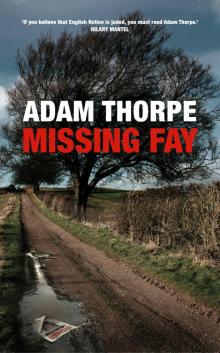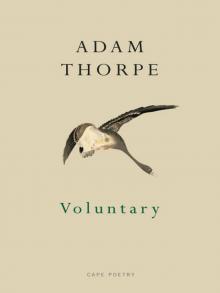- Home
- Adam Thorpe
The Standing Pool Page 3
The Standing Pool Read online
Page 3
‘Oh, not always,’ Nick grinned, a frown giving his irritation away.
Lucy hastily brought up the subject of speaking French. Hers was schoolgirl, it had got locked, it needed a kick-start and lots of axle-grease. ‘I’m going to have to have lessons,’ she grimaced, as if talking about surgery. ‘How’s yours?’
‘I can read it for research purposes but talking isn’t great,’ Sarah admitted. ‘Nick speaks it rather well.’
Nick waved a modest dismissal. Somebody had once taken him, after a brief exchange, for a Belgian. ‘You’ve got some very impressive, er, artefacts,’ he said, looking around him.
Alan was a specialist dealer in Near and Middle Eastern antiquities, it turned out. ‘Only the best,’ he says. ‘I don’t bother with anything else. No one’s told this guy that the game’s up,’ he went on, confusing them. ‘He’s like a Jap in the forest who thinks the war’s still being fought. The whole damn country of France is like a Jap in the forest who thinks the war’s still being fought. “Come on out, guys! It’s all over!”’
Alan laughed in wheezes, slapping the arms of the chair. Tammy paused in her drawing and took another biscuit, waiting a little before consuming it in rabbity nibbles.
‘Do go ahead,’ Lucy said to her, flatly. ‘Eat as many as you want.’
‘Thank you,’ said Tammy, with her mouth full.
‘That’s a great drawing,’ said Alan, leaning forwards with a grunt and turning it sharply towards him. It was of spindly horses under a tree with red apples and a volcano in the background over which flew a sinister black bird. ‘You know, Tabby, in certain New York galleries you could give that a pretentious name and say it’s by a recluse and you’d be into five zeroes. I’m thinking of going into that myself, as a dealer. It’s called Outsider Art. I prefer the French term: Art Brut. Raw Art.’
Tammy looked faintly bewildered.
‘Rubbish, in other words,’ said Lucy. ‘Not that your drawing’s rubbish, of course,’ she added, rather unconvincingly.
‘She’s really mad about drawing,’ said Sarah.
‘I’m not,’ Tammy complained. ‘It was your idea, Mummy.’
After an embarrassing pause in which everyone smiled, Lucy told them about the lawn. The lawn in embryo. ‘I’ve wanted, since time immemorial it seems, a proper English lawn, near to the pool so you can walk onto it off the tiles without lacerating your feet. I’ve told Jean-Luc that if he can’t do me a lawn, with proper soft grass –’
‘A lush sward,’ Nick broke in, smiling engagingly.
‘Exactly – then he’ll get the chop. I told him this two or three years ago, by the way.’
‘This suggests,’ Nick said, scratching his left eyebrow, ‘that earlier attempts by Jean-Luc have been unsuccessful?’ The last word was a hoarse croak.
‘This suggests I am remarkably tolerant,’ she said. ‘Oh, there’s always some little problem. The latest is climate change or something. Let us know of the lawn’s progress, please. Have you got a throat?’ she asked Nick, suddenly. ‘The air’s very dry down there.’
‘Pseudopolyps,’ he said, as if admitting to taking drugs.
‘Too much lecturing,’ said Lucy, sharply.
‘Stress. I’m told. Unlike Ferdinand Lassalle. Who painted his throat with silver nitrate so he could carry on lecturing, heroically.’
Lucy frowned. ‘Should I know this man?’
Nick tried to disguise his surprise behind a grin, but he was blinking too much: sometimes, Sarah thought, he really isn’t in the real world, where no one knows anything much.
‘The true founder of German socialism,’ he said. ‘Unlike Marx, he believed in brotherly love. Killed in a duel in 1864.’
‘Good riddance,’ chuckled Alan.
Sarah realised, concious of her feebleness, that there was no pulling out. Life was all about compromise, her mother had always said.
‘What should we do about the telephone costs?’ asked Nick.
‘Oh, there isn’t a telephone,’ said Lucy, as if they’d asked about an indoor cinema or a sauna. ‘Your mobile will work, but you have to stand on a stool in the bathroom. It’s the countryside, you know. Undisfigured by cables. There is an Internet café in St-Maurice, full of saddos. Alan goes there and feels very at home. Don’t you, darling?’
‘I picked up the mouse and there was this damn scorpion underneath,’ he chortled.
Nick felt dismayed: he didn’t want to admit that, for ideological reasons, they had never had a mobile.
‘Problem,’ said Sarah, glancing at Nick. ‘The thing is, we don’t have a mobile.’
‘Then get one,’ laughed Lucy.
‘It’s rather against our principles. Given our field of specialism.’
‘Coltan mining in the eastern Congo,’ Nick clarified. The Sandlers still looked puzzled, as if sucking on something tart. ‘Mobiles can’t operate without coltan, and most of it’s in the Congo forest. The local leaders use the revenue to buy arms. A third of the workforce are kids. Slavery, basically. And it’s disastrous for the gorillas, too. The Conradian darkness at the heart of the mobile phone industry. Actually, it’s also used in laptops and so on, but where computers are concerned I have no real choice, bar going for the more responsible names.’
There was an embarrassed silence in which Nick’s own voice echoed in his head, sounding crazed. Lucy and Alan looked at them as if they were vaguely dangerous. There was, in fact, a sleek black mobile on the arm of Alan’s chair. Nick banned them from his seminars, and was famous for it. It amused his students: Dr Mallinson’s eccentric foible.
Lucy gave a little sigh. ‘So the house is no good, then. Well, what a pity.’
They had no choice but to acquire a mobile for the duration of their stay. Purely for emergencies and to receive calls. Then they would bin it, they assured themselves, while Lucy and Alan gazed on them indulgently, as parents gaze on their naïve teenagers.
They were shown Alan’s private collection in a locked glass cabinet: these items were not for sale. He put on a pair of white cotton gloves and opened the cabinet and took out a couple of treasures. A ram-headed jug from Ur. A votive cup from Uruk. Around 3000 BC: rescued from the rubble of ziggurats. They weren’t allowed to touch. Sarah imagined them slipping out of his gloved hands and falling in slow-motion to the unforgiving stripped pine of the floor: it would only need a jab of the elbow in his large belly.
They were locked back in.
‘My precious children,’ he wheezed, tapping the glass with a gloved knuckle.
‘Iraq,’ Nick sighed, hoarsely: like a very distant army’s battle cry.
‘Great for crooked dealers like me,’ Alan chortled, his white-gloved hand seizing Nick by the elbow and shaking it as if it were a cocktail. Nick smiled gamely, too flabbergasted to comment.
Sarah gazed into the cabinet, picturing each priceless pot being attacked by a hammer in extreme slow motion: the tambourine sound of it.
‘Are your other children as “well-behaved”?’ Lucy asked her suddenly, miming the inverted commas with a waggle of her plum-varnished nails. She was referring to the small ad placed in various highbrow journals, but it took a moment for Sarah to cotton on.
Sarah stroked her daughter’s hair. ‘Well I’m bound to say yes, they are,’ she said. Tammy had red, claw-like felt-pen marks on her cheek. Sarah rubbed at them vaguely, but Tammy backed off.
‘Children tend to know no limits, these days,’ Lucy sighed. ‘Their mothers are too fat to bother. They pass hamburgers through the school railings.’
‘We try to establish firm boundaries,’ Sarah reassured her.
‘Your hair is loganberry,’ admired Lucy, a touch wonderingly. ‘The teeniest hint of dark red in the highlights. Lucky you.’
‘I don’t know for how much longer,’ winced Sarah, very pleased. Her Indian grandfather had resurfaced in the hair (which she had always considered blue-black), along with large black eyes under smoky lids.
‘Actually, Lucy is c
razy for young Jean-Luc,’ said Alan, as if it had been weighing on his mind. He turned and winked at Sarah. ‘Happened all the time in the slave colonies.’
‘Give us a break,’ Lucy retorted. She said that Jean-Luc lived with his sick old mum. ‘He’s probably gay,’ she added, with a peculiar wobble of the head. She gave a start and glanced down at Tammy. ‘I’m not even sure he can read and write properly,’ she added, floundering a little under the child’s stern gaze. Tammy finally opened her mouth and informed her that, in Boulogne last year, they saw a sign on a restaurant that said French Cock.
Nick was lying on his back. He didn’t move when the others approached from the side of the house. Only his head turned.
‘You won’t believe this,’ he said. ‘I’ve done it again. My back.’
The girls ran up and rolled on top of him, squealing. Sarah had to pitch in physically to throw them off, but this increased the fun. Like wasps, they kept returning: it was like the game they played every Sunday morning, clambering onto the bed and being pushed off. Because of his pseudopolyps, their father couldn’t yell at them. He couldn’t even yell in pain, not without damaging his vocal cords for good. Instead, he whimpered, pleading with them to stop.
‘Daddy’s hurt!’ screeched Sarah as best she could over their frenzy. ‘For God’s sake leave him alone!’
They did, eventually. The house looked down on them like an old, disapproving nurse. The boundless view had absorbed the din and was now silent – even more silent than before. Nick lay there under his family’s gaze and apologised.
‘It’s sitting too long in the car,’ Sarah said.
‘I hope it’s not a slipped disc, that’s all.’
‘What’s a slip diss?’ asked Alicia.
‘What a start,’ sighed Sarah.
‘I do apologise,’ said Nick, drily. ‘As a misbegotten blemish on the smooth order of things.’
‘What’s a slip diss?’
‘Is blemish the same as a bee in my bonnet?’ asked Tammy.
‘Shush,’ Sarah ordered, without thinking. ‘Try to get up carefully, Nick.’
The children watched, fascinated and a little scared.
‘I feel so daft.’
Sarah commanded him not to talk, giving him her hand. He winced and sank back.
‘Daddy deaded,’ announced Beans, pointing at his feet in their sensible English shoes.
‘No, actually he isn’t,’ Alicia assured her, with an authority that sounded medical.
‘Not yet,’ said her father.
‘Try rolling on your side,’ Sarah suggested. Part of her was annoyed with him. He neglected his body in favour of the head. A terrible start to their stay. She could see herself doing everything, everything. She pushed up her glasses and sighed.
He rolled over and slid onto all fours. ‘Now what do I do.’
‘I don’t know. Pray to Mecca.’
This made Nick laugh, against his will. Sarah joined in. And they both laughed helplessly, Nick in the evening-prayer position, groaning between the monkey-like yelps. Tears ran down their cheeks as the three sisters gazed on them like indulgent adults.
‘I think that’s done it,’ said Nick, eventually. He stood up in slow motion, stretched his arms above his head, then lowered them. He gingerly advanced a few steps, then stopped, like a waxwork of someone walking.
‘Fuck,’ he breathed.
The front door was on the side of the house, which made the side of the house the front. There was a dry flower nailed to it, like a big blind eye with golden eyelashes. Sarah slotted the black key into the hole. The door opened directly into the kitchen. Nick crawled in, inch by inch. He was crippled (it was his right hip’s swivel joint), but it was an old problem arising from a student drama exercise thirty-odd years ago. It had happened before and usually lasted a week. The only remedy was to lie on a firm surface for as much of the day as possible. It was maddening, especially as the girls’ favourite game was to ride him like a horse. He could just about go upstairs, but as little and as slowly as possible.
‘This is so incredibly predictable,’ he sighed, lying on the rug in the sitting room and feeling chilly under the blanket. ‘I’m so sorry.’
‘So you should be,’ said Sarah.
But he still shared in their awestruck excitement, the analysis initially conducted in subdued whispers.
There was a pleasant woody smell in the house, along with a hint of mice. It was cold in a flat, fridge-like way. The sitting room had two long windows facing the front and huge, thick beams. Low-slung sofas which were useless to bounce on, a fireplace the kids stood in pretending to burn in agony like Joan of Arc, a bookcase full of what the Mallinsons assumed would be light holiday reading, apart from the large expensive art volumes, but turned out to host a decent, spine-creased smattering of mainly American and Irish literature, including a Complete Yeats and an annotated Collected Shakespeare bearing cigarette-papers as bookmarks. Lucy, they assumed.
The dining room was across a narrow corridor from the kitchen; it had a huge antique oak table and numerous porcelain statuettes of shepherdesses, clearly valuable. Sarah opened the dresser and saw a small scorpion on the side, its pincers wincing at the intrusion. ‘I think we’ll give this room a miss,’ said Sarah.
‘I love it,’ said Tammy, naturally.
A low door off the corridor led down uneven steps to an interior cave, in which some thirty bottles were ranged on ancient wooden wine-shelves, the dark glass blessed with pale dust. The oldest – a Bordeaux – dated from 1982.
‘I think we’ll give this a miss, too,’ said Sarah.
Upstairs had to be described to the afflicted: the bedrooms had white walls which left powdery traces on their clothes if leaned on. The walls were thicker than Beans’s outstretched arms (Tammy tested her protesting form against them). The windows only opened inwards, which meant nothing could be put on the sills: this struck Sarah as bad design. There was a sweet little table in the bedroom, painted yellow and stencilled with grapes, which she earmarked for her desk. The small room at the back, with its miniature window overlooking the pool, could be Nick’s den: it vaguely reminded her of his book-lined outpost at college, dark and woody.
Right at the top was the attic, reached by a narrow wooden staircase and lit by a dirty Velux: it was huge, bare and dusty, with old newspapers from the 1940s and 1950s, a box of pine cones, some venerable spindle-shanked spiders, a heap of dried bracken, a crate of bottles, and nothing much else.
After hauling everything out of the car with almost no help from the girls, Sarah began to prod the kitchen into life. It was long and had a butcher’s block flecked with saw- and blade-marks, with a tell-tale depression at one end where the cleaver had worked over generations. Stools stood round it. There was what Sarah termed a ‘catering-industry sink’ of stainless steel, deep enough to drown someone in. Apart from the large fridge, there was a small, independent freezer. There was no dishwasher, amazingly.
No one had cleaned the house in preparation, as had been promised; or not in the last few weeks. The attic spiders’ comrades were evident in all of the rooms, but the industrial-sized hoover dealt with them briskly as the girls watched, pretending to feel sorry as the frail, unsuspecting forms were whipped away by the hoover’s grin.
Sarah was fed up, despite being here. Her fed-upness was deeper than travel weariness. For eight years she had bustled from one toy-strewn, high-decibel environment to another, sitting on rugs while infants battered her head with bright moulded plastic or flung themselves from side to side in her lap while she tried to engage in grown-up speak. Now, despite Nick being freed of commitments, she was still the domestic skivvy.
To her husband’s annoying commentary (he now lay prone on the longest sofa), she prepared the fire with balls of the Daily Telegraph. There was something propitiatory about coaxing flame, she thought. Above the fireplace was an African mask fringed by hundreds of hammered-in nails that Tammy identified as its beard; it made her mothe
r think of a mournful Victorian with mutton-chop whiskers. They were unable to identify its provenance. A crack went through one eye, blinding it; the upper lip was chipped and worm-holed.
‘How’s it going?’ Nick asked, yet again.
He had brought along a Complete Sherlock Holmes for diversion and now he was working his way through it, tale after tale, interspersed with the odd dip into Habermas.
The room was opaque with smoke. Beans coughed. Alicia copied her. Tammy outclassed them.
‘I think there’s a blockage,’ Sarah said, peering up into the flue.
‘If you don’t mind me saying, you need to use smaller bits at the beginning.’
‘Crap. Girls, that’s enough or you’ll end up like Daddy.’
‘Oh, what a dreadful fate,’ groaned Nick, genially.
They would have to phone Jean-Luc, but not straightaway. They didn’t want to look helpless. The girls went upstairs and carried on coughing: it was fun pretending to be tubercular.
The volume control was dicky on the telly and the reception was poor, but the old video machine worked. The girls eventually sat down on cushions to watch Postman Pat driving up and down his Yorkshire hills and dales while Nick dozed and Sarah leafed through Exciting Things To Do with Nature, an old-fashioned book she’d found in a jumble sale. She’d pictured the girls turning branches into animals, painting pebbles or making pomanders out of oranges and cloves. She could have done all these things at home, of course, but there was never enough time and Nature wasn’t quite what it used to be, somehow. Now there was bags of time.
The girls settled with difficulty, bouncing about on their beds and then promptly getting scared the moment the light was switched off. Even Tammy was scared. Without the shutters closed, it was as black as ink outside, the stars glittering through rents in the cloud. At home in Cambridge, comforting yellow streetlight defeated the curtains, accompanied by the ambient wash of urban noise.
Only one of the bedside lamps worked, and Sarah briefly assumed the intricate skills of a film-lighting engineer, moving it about on the floor until a compromise was reached and they were neither dazzled nor plunged into gloom.

 Missing Fay
Missing Fay Hodd
Hodd Pieces of Light
Pieces of Light The Standing Pool
The Standing Pool Ulverton
Ulverton Nine Lessons From the Dark
Nine Lessons From the Dark Flight
Flight The Rules of Perspective
The Rules of Perspective From the Neanderthal
From the Neanderthal Is This the Way You Said?
Is This the Way You Said? Still
Still No Telling
No Telling Voluntary
Voluntary Between Each Breath
Between Each Breath